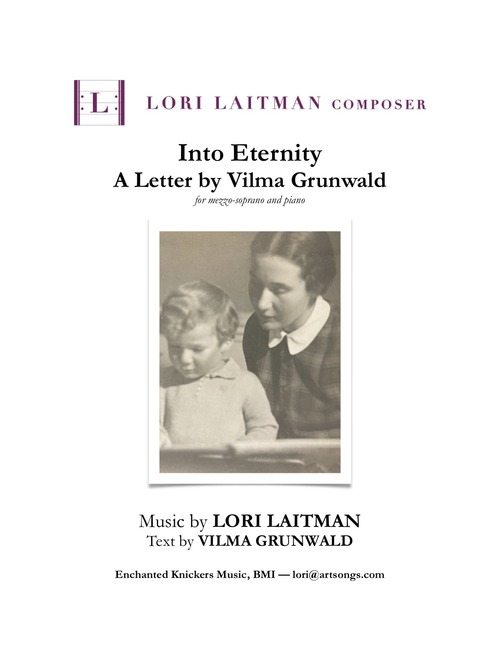2022| mezzo-soprano/piano.
Text by Vilma Grunwald, translated by Frank Grunwald (1932-2023). Written as a gift for Holocaust survivor Frank Grunwald in 2022. The work premiered online on June 4, 2023, presented by Indianapolis Opera — with mezzo-soprano Lyndsay Moy and pianist Maria Lyapkova. Frank Grunwald gave the introduction. Music starts at 6:56.
There is another excellent setting of this letter by the Dutch composer Marian von Tilzer.

The story:
David Starkey, the General Director of Indianapolis Opera, introduced me to Holocaust survivor Frank Grunwald in March 2022, during the Opera’s double bill of Hans Krasa’s Brundibar and my Holocaust-themed oratorio Vedem. What a privilege to meet Frank, hear his story and learn about his mother’s extraordinary letter, which is the basis for this song.
In December 1943, Dr. Kurt Grunwald, his wife Vilma and their two sons, John and Miša (later Frank), were transported from Terezin to Auschwitz. They were able to live together for several months in a family camp. But in July 1944, the Nazis ended the family camp arrangement. Kurt was sentenced to work. Both John (16) and Miša (11), as well as hundreds of other children, were selected to be killed in the gas chamber when a prisoner (a German, in charge and representing the Jewish Family Camp) suddenly appeared and saved Miša’s life by quickly placing him into an older group of boys who were eventually used as slave laborers. However, John, who had a limp, was selected for death, and his mother Vilma opted to accompany him. She penned this letter on July 11, 1944, waiting for the trucks to take them to the crematorium.
Kurt and Miša survived the Holocaust and both emigrated to the United States. Kurt never shared the letter with Frank, who found it after his father’s death.
It is Frank’s translation that I have set to music, and I am profoundly grateful to him for allowing me to do so. It is amazing to me that Vilma could write such beautiful and comforting words at such a moment.
There are two musical motifs derived from the words that I use as refrains in the accompaniment. The first accompanies the words “since we felt it would be hopeless”. When Vilma writes “I am completely calm,” there is a change of character in the music and this motif is later interspersed through the song. The momentum slows near the end of the song as Vilma and John are awaiting the trucks to take them to the crematorium. I then quote from myself — my setting of “eternity” from a prior song cycle The Ocean of Eternity — as the circular, descending melodic motion of the vocal line seems right for capturing the flowing river of time. The piece ends with a last repetition of the “calm” theme and Vilma’s name.